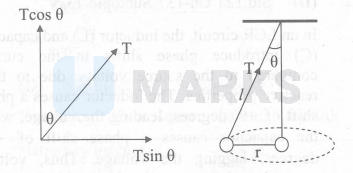Search any question & find its solution
Question:
Answered & Verified by Expert
A ball of mass ' $\mathrm{m}$ ' is attached to the free end of a string of length ' $l$ '. The ball is moving in horizontal circular path about the vertical axis as shown in the diagram.
The angular velocity ' $\omega$ ' of the ball will be [ $\mathrm{T}=$ Tension in the string. $]$

Options:
The angular velocity ' $\omega$ ' of the ball will be [ $\mathrm{T}=$ Tension in the string. $]$

Solution:
2447 Upvotes
Verified Answer
The correct answer is:
$\sqrt{\frac{\mathrm{T}}{\mathrm{m} l}}$

The tension in the string can be resolved in two components along the perpendicular axis. The gravitational force is acting downwards and the centrifugal force is acting in $-\mathrm{x}$ direction
$$
\begin{aligned}
& \mathrm{T} \sin \theta=\mathrm{mr} \omega^2 \\
\therefore \quad & \omega^2=\frac{\mathrm{T} \sin \theta}{\mathrm{mr}}
\end{aligned}
$$
$$
\therefore \quad \omega=\sqrt{\frac{\mathrm{T} \sin \theta}{\mathrm{mr}}}
$$
From figure, $\sin \theta=\frac{\mathrm{r}}{l}$
$$
\begin{aligned}
& \therefore \quad \omega=\sqrt{\frac{\mathrm{Tr}}{\mathrm{mr} l}} \\
& \therefore \quad \omega=\sqrt{\frac{\mathrm{T}}{\mathrm{m} l}} \\
&
\end{aligned}
$$
Looking for more such questions to practice?
Download the MARKS App - The ultimate prep app for IIT JEE & NEET with chapter-wise PYQs, revision notes, formula sheets, custom tests & much more.